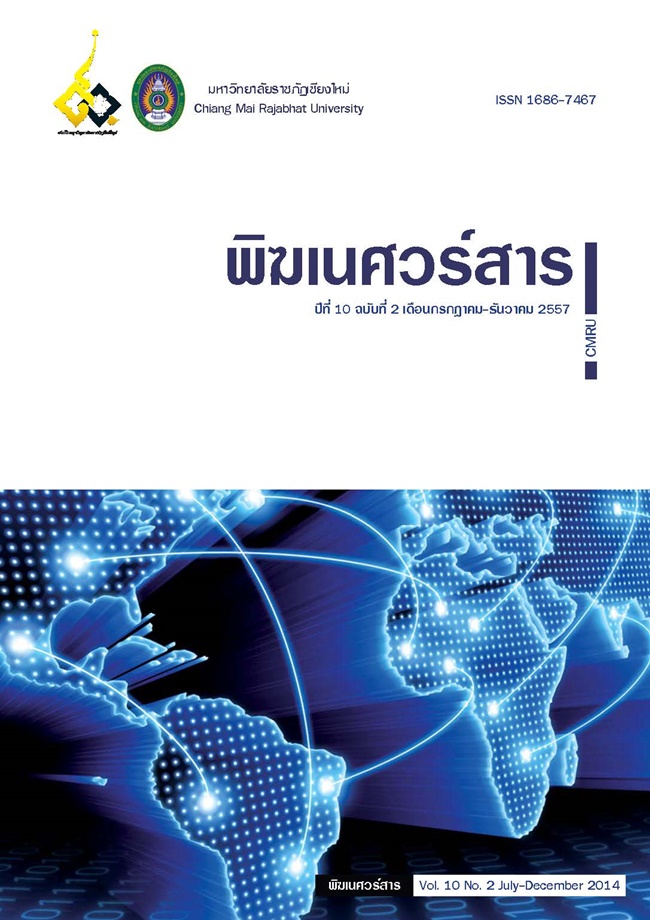การสร้างหลักสูตรสถานศึกษารายวิชาเพิ่มเติมอาชีพในท้องถิ่น : การทำเมี่ยงชั้นประถมศึกษาปีที่ 6
Main Article Content
Abstract
การวิจัยครั้งนี้มีจุดมุ่งหมาย เพื่อสร้างหลักสูตรสถานศึกษา รายวิชาเพิ่มเติมเรื่อง อาชีพในท้องถิ่น : การทำเมี่ยง เพื่อประเมินหลักสูตรสถานศึกษา รายวิชาเพิ่มเติมเรื่อง อาชีพท้องถิ่น : การทำเมี่ยง ประชากรที่ใช้ในการวิจัย ได้แก่ นักเรียนชั้นประถมศึกษาปีที่ 6 ปีการศึกษา 2556 สำนักงานเขตพื้นที่การศึกษาประถมศึกษาเชียงใหม่ เขต 2 จำนวน 14 คน ผู้ปกครองนักเรียน จำนวน 14 คน ครูโรงเรียนวัดบ้านเหล่า จำนวน 2 คน คณะกรรมการสถานศึกษาขั้นพื้นฐาน จำนวน 9 คนและผู้บริหารสถานศึกษา จำนวน 1คน รวมทั้งสิ้น จำนวน 40 คน เครื่องมือที่ใช้ในการวิจัยประกอบด้วย แบบสัมภาษณ์แบบไม่มีโครงสร้าง ประเด็นสนทนากลุ่ม หลักสูตร แบบประเมินหลักสูตรแบบทดสอบวัดผลสัมฤทธิ์ แบบประเมินความพึงพอใจและแบบสอบถามความคิดเห็นเกี่ยวกับหลักสูตร วิเคราะห์ข้อมูลโดยใช้การวิเคราะห์เนื้อหา (Content Analysis)ค่าร้อยละ(Percentage) ค่าเฉลี่ย (Mean)
ผลการวิจัยพบว่า
1. การสร้างหลักสูตรผลการศึกษาข้อมูลพื้นฐาน พบว่า บุคลากรที่มีส่วนเกี่ยวข้องต้องการให้มีการสร้างหลักสูตรสถานศึกษา รายวิชาเพิ่มเติม เรื่อง อาชีพในท้องถิ่น:การทำเมี่ยง เพื่อสืบทอดภูมิปัญญาท้องถิ่นและบุคลากรที่เกี่ยวข้องต้องการพัฒนาหลักสูตรให้มีเนื้อหาสาระเหมาะสมกับบริบท นำไปใช้ในการดำรงชีวิตได้ ผู้เรียนเกิดความรู้คู่คุณธรรม จริยธรรม และส่งเสริมให้นักเรียนเป็นคนดี คนเก่ง และอยู่ในสังคมได้อย่างมีความสุขการพัฒนาหลักสูตรได้หลักสูตรสถานศึกษา รายวิชาเพิ่มเติม เรื่อง อาชีพในท้องถิ่น:การทำเมี่ยงประกอบด้วย วิสัยทัศน์ หลักการ เป้าหมาย จุดมุ่งหมาย โครงสร้าง คำอธิบายรายวิชา เวลาเรียน แนวการจัดการเรียนรู้ การวัดผลและประเมินผล สื่อการเรียนรู้ และแผนการจัดการเรียนรู้ จำนวน 10 แผน ผู้เชี่ยวชาญประเมินองค์ประกอบของหลักสูตร พบว่า ค่าเฉลี่ยของการประเมินหลักสูตร เท่ากับ4.93 ระดับความเหมาะสมมากที่สุด เนื้อหาของหลักสูตรมีความสอดคล้องกับจุดประสงค์ และมีความเหมาะสมที่จะนำไปใช้ในการจัดการเรียนรู้ ค่าดัชนีความสอดคล้อง IOC เท่ากับ 0.98
ผลการใช้หลักสูตรสถานศึกษา รายวิชาเพิ่มเติม เรื่อง อาชีพในท้องถิ่น : การทำเมี่ยง พบว่านักเรียนมีความสนใจในการเรียน เรื่อง อาชีพในท้องถิ่น:การทำเมี่ยงและตั้งใจทำกิจกรรมทั้งภาคทฤษฎีและภาคปฏิบัติ กล้าซักถาม กล้าแสดงความคิดเห็นอย่างมีเหตุมีผล สืบเสาะหาความรู้จากแหล่งเรียนรู้หลากหลายรูปแบบ ทำงานเป็นกลุ่มและวางแผนแบ่งงานตามหน้าที่รับผิดชอบ ปฏิบัติกิจกรรมอย่างมุ่งมั่น ผู้เรียนร้อยละ 85.71 มีผลการเรียนระดับ3 ขึ้นไปความพึงพอใจของผู้เรียนที่มีต่อกิจกรรมของหลักสูตรอยู่ในระดับ มาก ค่าเฉลี่ย เท่ากับ 4.35
2. การประเมินหลักสูตร
ผลการประเมินและปรับปรุงหลักสูตร โดยใช้รูปแบบการประเมินแบบ ซิปป์ (CIPP Model) โดยประเมิน 4 ด้าน ได้แก่ ด้านบริบท ด้านปัจจัยเบื้องต้น ด้านกระบวนการ และด้านผลผลิต พบว่า การประเมินด้านปัจจัยเบื้องต้นมีความเหมาะสมอยู่ในระดับมากที่สุด ค่าเฉลี่ยเท่ากับ 4.98 รวมค่าเฉลี่ย 4 ด้าน เท่ากับ 4.81 อยู่ในระดับ มากที่สุด แสดงว่าหลักสูตรมีความเหมาะสม นำไปใช้ได้
THE DEVELOPMENT OF LOCAL OCCUPATION STUDY AS AN ADDITIONAL COURSE FOR SCHOOL–BASED CURRICULUM : MIENG MAKER PRATHOMSUKSA 6
The purposes of this study were to develop and evaluate an additional course for school-based curriculum on local occupation focusing on local occupation of “Mieng Maker” (manufacturer of tea leaves wrapped). Out of forty total population employed in the study, fifteen were Prathomsuksa six students who studied in the 2nd semester of academic year B.E.2556 in Chiang Mai Primary Educational Service Area 2, fourteen parents of those students, two teachers of Ban Lao School, nine Board of Directors of Basic Education and one school principle. Research instruments used in this study were unstructured interview questions, group discussion, the curriculum, curriculum assessment form, academic achievement test, satisfaction survey and questionnaires on opinions toward the curriculum. This study also employed content analysis, percentage, mean and index of Item – Objective Congruence (IOC) as methods for data analysis.
The results of this study found as follow;
1) all stakeholders surveyed agreed that the additional course for school curriculum on local occupation, “Mieng Maker”, should be developed in a manner that allow students to practically apply such lesson learned in real life and to be incorporated with concepts of moral and ethics to encourage students to become good members of local community. The successfully developed curriculum, which consists of course’s vision, course principles, course target and objectives, course structure, course description, learning period, learning management process, assessment and evaluation, instructional media, and 10 units of lesson plans, was evaluated by experts and found to achieve the “most appropriate” level with average score of 4.93. Curriculum content is consistent with the objectives and suitable to be used for learning management with 0.98 of index of Item – Objective Congruence (IOC). After using the curriculum, students were found to be interested to learn about local occupation and enthusiastically took part in both theoretical and practical parts of the course. Students were also found to be more confident to ask, share reasonable opinions, keen to seek knowledge from various learning resources, worked as a team with allocated work by role & responsibility, and committed to their duties. In addition, 85.71 percent of students in the course achieved at least grade 3 for their academic performance and the satisfaction of students engaged in the curriculum was found to be in a high level of 4.35 mean score.
2) Curriculum assessment and development using CIPP Model in four areas, including contextual, the primary factors, processes and output, was found to achieve the highest appropriateness level on the primary factors with an average score of 4.98 while the total average on four areas was 4.81, which is the highest level, indicating the this curriculum is suitable to be used for learning.
Downloads
Article Details
The articles published are copyrighted by the Graduate School, Chiang Mai Rajabhat University.
The opinions expressed in each article of this academic journal are solely those of the individual authors and do not reflect the views of Chiang Mai Rajabhat University or its faculty members. The responsibility for the content of each article rests entirely with the respective authors. In the event of any errors, the authors alone are responsible for their own articles.


